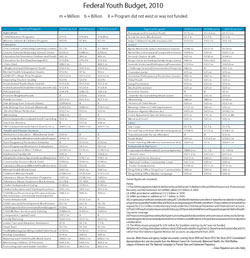|
Click Image for PDF of Chart |
The fiscal 2010 omnibus spending bill provides $100 million for competitive grants in a key mentoring program.
The White House had requested $80 million for the Youth Mentoring Grants program, which is run by the Justice Department’s Office of Juvenile Justice and Delinquency Prevention (OJJDP), but congressional appropriators boosted the total. They also added a requirement that the Obama administration report within 60 days on the criteria and methodology it would use to award the grants. Lawmakers said they expected that “OJJDP will take all steps necessary to ensure fairness and objectivity in the award of these and future grants.”
That sounds like a reaction to the controversial grant-making decisions of J. Robert Flores, who ran OJJDP under President George W. Bush and whose grants were investigated by a congressional subcommittee as a result of stories in Youth Today.
That’s not to say members didn’t use their power of the purse to earmark other OJJDP funds for mentoring projects that won’t have to compete for federal largesse. Several “mentoring partnerships” were among hundreds of organizations receiving more than $91 million in congressional earmarks from another OJJDP account.
MENTOR/National Mentoring Partnership, an advocacy group, sent a news release to praise these mentoring earmarks, among others in the bill:
• Chamber Education Foundation/Rhode Island Mentoring Partnership, in Warwick, $400,000.
• Delaware Mentoring Council in Newark for Mentoring Initiatives for At-Risk Children and Youth, $750,000.
• Governor’s Prevention Partnership in Hartford, Conn., for the At-Risk Youth Prevention Initiative, $250,000, and the Prevention Initiative for At-Risk Youth, $300,000.
• Mobius, Vt., Mentoring Collaborative, $500,000.
• North Carolina Mentoring Partnership in Raleigh for Mentoring Programs for At-Risk Youth, $400,000, and Mentoring At-Risk Youth, $100,000.
• Virginia Mentoring Partnership in Richmond for Mentoring Programs for At-Risk Youth, $200,000.
• Washington State Mentors, in Issaquah, for the Mentoring Initiative for At-Risk Youth, $300,000.
The earmarks do not count against the $100 million specifically appropriated for competitive mentoring grants, and other support for mentoring programs may come from different accounts.
OJJDP says in its 2010 proposed program plan that mentoring will be supported in several ways, including funding national organizations to strengthen and expand existing mentoring activities; building capacity of and incorporating research into youth mentoring efforts at all levels of government; and expanding communities’ ability to extend mentoring services to “populations of at-risk youth who are underserved due to location, shortage of mentors, special physical or mental challenges, or other situations identified by the community [as] in need of mentoring services.”
Mentoring services are also emphasized in the Second Chance Act Adult and Juvenile Offender Reentry Demonstration Project, which received $37 million in funding for this year. Another $15 million was appropriated in 2010 for the act’s mentoring and transitional services to assist individuals coming home from jail and prison. Last year, some of the funds for that program were directed to mentor reintegrating youths, according to the Reentry Policy Council, which closely follows the Second Chance Act.
Other federal agencies also received youth mentoring funds, including the U.S. Department of Health and Human Services, whose Mentoring Children of Prisoners program was increased slightly from its 2009 level of $49.3 million to $50 million for this fiscal year.


























